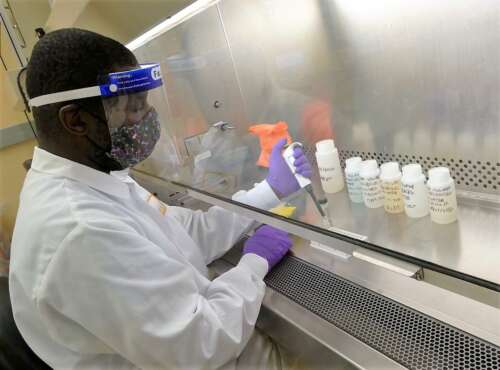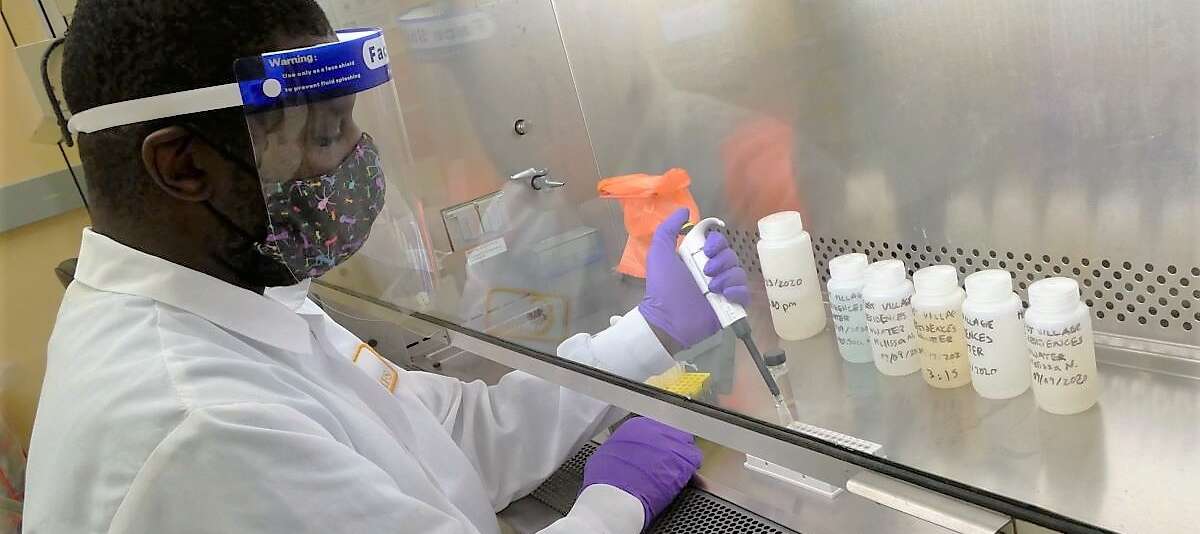
A research project aimed at the early detection and prevention of enteric and food-borne illnesses has received $1.15 million from the Ontario Research Fund (ORF).
The funding is the province’s contribution to a project valued at nearly $6.5 million.
Led by Dr. Lawrence Goodridge, a professor in the Department of Food Science, the three-year project is focused on using genomic science in the rapid detection of food-borne illness outbreaks – through a combination of wastewater monitoring and the monitoring of social media for keywords associated with specific illnesses.
Goodridge said the combination of wastewater monitoring and social media analysis could detect community outbreaks that otherwise go undetected.
“Outbreaks of foodborne diseases in Canada are not detected until a sick individual seeks medical care,” said Goodridge, the Leung Family Professor in Food Safety, and director of U of G’s Canadian Research Institute for Food Safety and the University’s Food Safety and Quality Assurance Program. “Many infected people do not seek care, meaning that public health officials do not know about them.”
This can delay identification of foodborne outbreaks by an average of 3 -5 weeks, which means contaminated food stays in circulation, with more people consuming it and becoming sick, he added.
“The ORF funding will allow us to develop a completely new approach to detection of foodborne outbreaks through active surveillance of wastewater to identify increases in the presence of foodborne pathogens at the community level, coupled with social media surveillance to identify those people in the community who are infected,” he said. “This approach will allow us to detect foodborne outbreaks in near real time.”
Rapidly identifying foodborne outbreaks will enable the removal of the contaminated food from circulation more quickly, thereby decreasing both the magnitude and duration of foodborne outbreaks in Canada, he said.
Every year, four million Canadians are sickened by eating contaminated food, leading to more than 14,000 hospitalizations and more than 300 deaths each year. Food-borne pathogens cost the Canadian economy about $4 billion a year.
The Public Health Agency of Canada (PHAC) and Université Laval in Quebec are partners in the U of G-led project. PHAC will soon begin implementing a new system based on this research in a select number of cities – Quebec City, Guelph and Winnipeg.
The $6.5 million project includes work on COVID-19 detection. Like foodborne pathogens the SARS-COV-2 virus can also be found in wastewater. Last year, Goodridge and his team began utilizing the same genomics science to track the presence of the COVID-19 virus in wastewater to find a way to prevent outbreaks. The wastewater systems of several U of G student residences were the testing ground of the separate project.
“The COVID-19 pandemic has reignited interest in wastewater surveillance, where sewage systems are monitored for the presence of viruses, bacteria and other pathogens,” Goodridge said.
The $6.5 million project is funded by Genome Canada through Ontario Genomics, with additional funding coming from provincial governments, businesses, and research partners.
“Dr. Goodridge’s research will create an incredibly smart early warning system for threats to human health,” said Dr. Malcolm Campbell, vice-president, research. “It is awe-inspiring to think of the tremendous benefit this research could have for the future well-being of our world, in terms of safeguarding public health and safety, the environment, and society at large.”
In total, U of G researchers were awarded more than $4.3 million from ORF and Early Researcher Awards programs. Research addressing sustainability in the dairy and poultry industry were also awarded.
The funding is part of a $70.4 million investment in 176 Ontario research and innovation projects in the province’s colleges, universities, research institutes and research hospitals.
